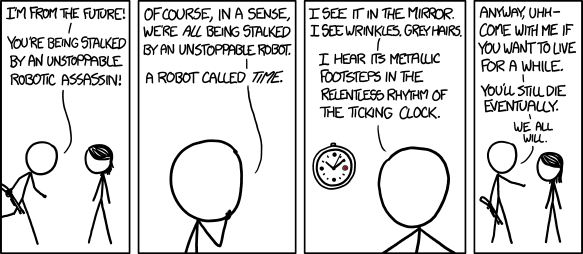 |
| from xkcd |
Friday, 22 February 2013
Tuesday, 19 February 2013
Crisps and Chips - UK and US English
Yesterday evening I was delighted to have a Skype discussion with a book club in Defiance, Ohio, (how cool a name is that for a town?) who were reading Remix. It's awesome not only to be able to chat to readers across the Atlantic, but to see them on screen.
Karen, who contacted me, had made a list of unfamiliar British expressions she'd come across in my novel; she and the other members guessed the meaning then I attempted to give a definition. What struck me was how many words in use here are unknown over there - so many that I now have a new respect for my American readers. I knew about the obvious ones, like tap and faucet, boot and trunk, trousers and pants, but that's not the half of it.
One word I'd already learned about and have avoided in my later books is "jumper". In America, a jumper is a sleeveless dress worn over a blouse or sweater or a child's garment consisting of straight-legged pants attached to a biblike bodice. When Caz pulls on a sloppy jumper over her dress US readers are not visualizing her outfit as I see it. I now stick to sweater.
Jeff Pike was responsible for the most incomprehensible words as he uses slang and swears a lot. Examples: "can't be arsed," "I don't give a toss," "saddo", "tosser", "poncey", "gaff". Caz's vocabulary is milder, but "Bog off" and "bally" were puzzling.
I didn't know that in America a plaster is a bandaid. A torch is a flashlight. Karen explained that a torch means a flaming brand; the advantage is theirs, as we have to make do with one word for both. Chocolate digestives are unknown in the US, and I struggled to explain why they are called digestives (possibly advertised as good for the digestion?)
Parkour and ligger are perhaps a little obscure even in this country. Still, what good is a book if you don't learn the odd new word from it?
Karen, who contacted me, had made a list of unfamiliar British expressions she'd come across in my novel; she and the other members guessed the meaning then I attempted to give a definition. What struck me was how many words in use here are unknown over there - so many that I now have a new respect for my American readers. I knew about the obvious ones, like tap and faucet, boot and trunk, trousers and pants, but that's not the half of it.
One word I'd already learned about and have avoided in my later books is "jumper". In America, a jumper is a sleeveless dress worn over a blouse or sweater or a child's garment consisting of straight-legged pants attached to a biblike bodice. When Caz pulls on a sloppy jumper over her dress US readers are not visualizing her outfit as I see it. I now stick to sweater.
Jeff Pike was responsible for the most incomprehensible words as he uses slang and swears a lot. Examples: "can't be arsed," "I don't give a toss," "saddo", "tosser", "poncey", "gaff". Caz's vocabulary is milder, but "Bog off" and "bally" were puzzling.
I didn't know that in America a plaster is a bandaid. A torch is a flashlight. Karen explained that a torch means a flaming brand; the advantage is theirs, as we have to make do with one word for both. Chocolate digestives are unknown in the US, and I struggled to explain why they are called digestives (possibly advertised as good for the digestion?)
Parkour and ligger are perhaps a little obscure even in this country. Still, what good is a book if you don't learn the odd new word from it?
Tuesday, 12 February 2013
Conduct becoming a writer
Once upon a time authors were mysterious beings, recognizable to their readers only by a black and white photograph on the inside flap of a hardback cover, or occasionally at book signings. The internet has changed all that. Most writers have websites, Facebook pages, blogs and twitter accounts; we are there to be found by anyone who is interested.
We also have the opportunity to disgrace ourselves like never before, achieving instant fame of a really, really undesirable kind (see this Guardian article on poor Jacqueline Howett). Here are a few things I've learned about appearing on the internet...
We also have the opportunity to disgrace ourselves like never before, achieving instant fame of a really, really undesirable kind (see this Guardian article on poor Jacqueline Howett). Here are a few things I've learned about appearing on the internet...
- It's not good to get into rows on forums. If things start to get heated I wander off and do some useful task like the washing up. I don't have to have the last word.
- About reviews - even the wrongest person from Planet Wrong is entitled to his opinion.
- Bear in mind that people you write about will come across your remarks.
- No one needs to know what your politics are, or your religion come to that. It may put them off, even if you aren't National Front and Wicca (with apologies to all witches).
- Being polite and helpful is a Good Thing. It's also good for your image.
- Moaning and grumbling are to be avoided.
What would you add?
Subscribe to:
Comments (Atom)













